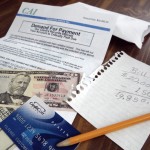The Costs of Foreclosure (and Maybe Some Savings too?!?)

Foreclosure is a difficult process for individuals that are going through the process. Often, it is a result of a change in life circumstances, like a failed marriage, a lost job, or a bankrupt business. Because of the difficult financial position that they find themselves, they are not in a position to pay for legal advice associated with their largest debt obligation, their mortgage.
Foreclosure is can be a costly process for lenders as well. Instead of receiving the monthly payments for the debt as they are expecting, they are required to apply internal administrative resources to collection, and often employ outside counsel, with the hope that they will collect their legal costs as part of the foreclosure process. While these costs clearly part of their business decision to deliver these products, their obligation to their shareholders result in them collecting as much as they are able to defray costs and obtain profit expected from these failed lending transactions.
The result is that represented lenders and unrepresented borrowers are often put head to head in court sorting out these claims. A lender finds themselves asserting as many costs as are defensible under the agreement they entered into, and the borrowers may struggle to assess what costs are appropriate. A recent decision in Saskatchewan in CIBC Mortgages Inc v Eldstrom, 2014 SKQB 337 (CanLII), <http://canlii.ca/t/gf5zr> provide some clear direction to counsel for lenders as to what costs will be acceptable at a pre-leave stage of the action. This is the point where counsel for the lender is looking from the court for permission to commence a claim seeking relief.
In this decision, the property was in arrears for 8 months at the time of the application. The owner looking to sell the property, but the lender was seeking leave and had the following costs listed in the Affidavit of Default:
a) Principal balance: $478,989.41
b) Accrued interest: 19,599.01
c) Property Tax: 1,997.00
d) Prepayment Charge: 7,084.96
e) Cash Back: 15,600.00
f) Occupancy check costs: 42.00
They also requested pre leave legal costs associated with the transaction, the amount of which was not specified, and the amounts lent and interest accrued under a second mortgage.
The Court’s issue was with the last three claims in the Affidavit of Default and the pre-leave costs. Clearly, the bank would allow the principal amount and the interest. The property tax is also specifically allowed for in the relevant legislation. However, the problems with the remainder were as follows:
1. Prepayment Charge – As soon as the lender takes the step of demanding the full amount rather that just arrears, the lender is no longer able to claim the prepayment penalty. The equitable right of redemption was triggered.
2. Cash Back – There was an agreement said that “based on cash back agreement that you signed” an amount would be repayable to the lender. There was no Cash Back Agreement signed, or provided by counsel. The court declined the relief sought.
3. Occupancy Check Costs – an admin cost provided for in the agreement, but precluded by the Limitation of Civil Rights Act. The court declined this amount.
4. Pre-leave costs – There is ample case law on when you can request legal costs from borrowers prior to the leave step, and it is usually based on the conduct of the borrower up until that step. The lawyer did not provide sufficient particulars on the claim, and so the court requested further material to be filed before making a decision on this matter.
The application was adjourned three months in order to give the owners more time to sell the property, and the lender was required to resubmit materials that omitted some of the claims that were denied by the court. The mortgagee was also required to pay costs in the amount of $200 to the mortgagor.
The interesting thing for me is how there could potentially be some savings for the owner by going through the foreclosure process. One could imagine that in a situation where there is a significant prepayment penalty owing that it may make economic sense to stop paying your mortgage. It may force the demand for payment from your lender and eliminate the requirement to pay the prepayment penalty. Depending on the manner in which this was done, it may provoke the payment of pre-leave costs for legal fees. I’d also imagine there would be significant negative effects on credit. Obviously, an area to get advice on before someone considers proceeding in that fashion. I’d be interested to hear from counsel who does these types of foreclosures more regularly if they have seen that as an issue.








Leave a Reply
Want to join the discussion?Feel free to contribute!